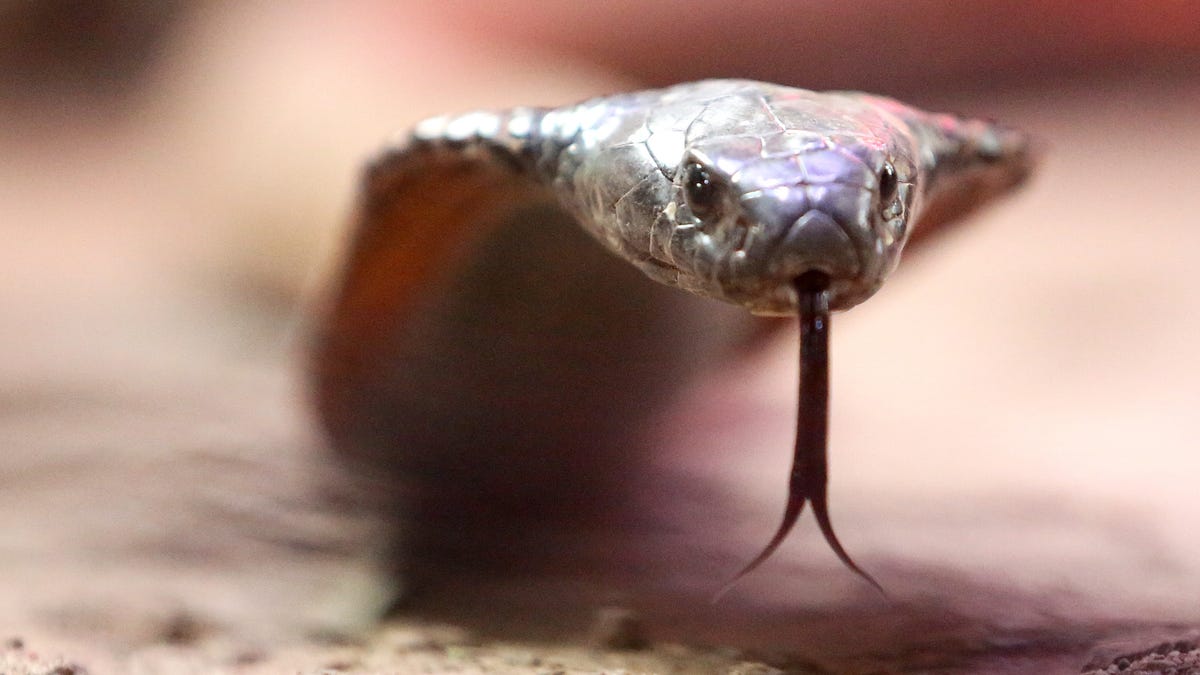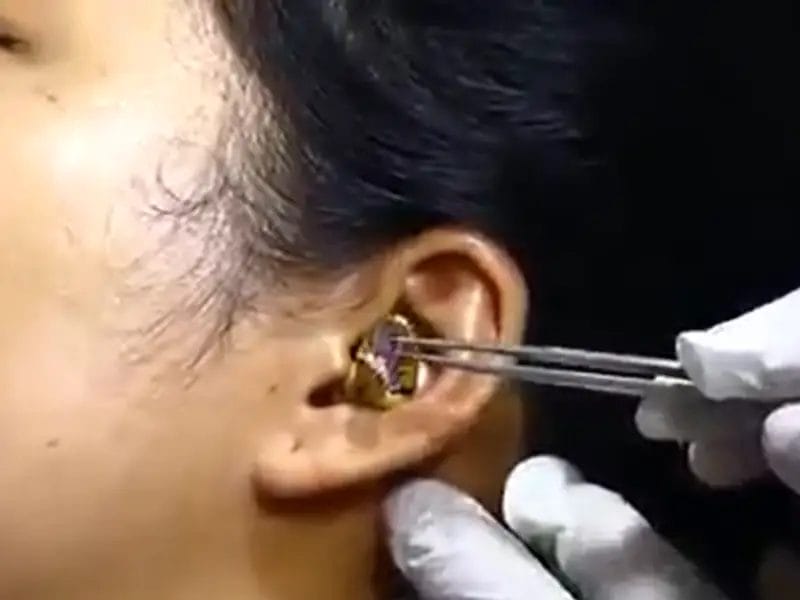Dealing with a snake in your garage can be a daunting task, but it’s important to handle the situation calmly and safely.
First and foremost, it’s crucial to identify the species of snake you’re dealing with, as some can be venomous. If you’re uncertain, it’s best to call a local wildlife professional who can safely remove the snake.
If you feel comfortable handling the situation yourself, you can use snake tongs or a snake hook to gently lift and relocate the snake to a more suitable habitat away from your garage.
Remember to wear protective clothing, such as gloves and boots, and maintain a safe distance from the snake to avoid any potential bites.
After successfully removing the snake, it’s essential to seal any gaps or cracks in your garage to prevent future snakes from entering. Additionally, keeping your garage clean and organized will discourage snakes from seeking shelter in the first place.
Remember, when it comes to snake removal, prioritize your safety and never hesitate to seek professional assistance if needed.

Snake-Proofing Your Garage: Tips to Prevent Snakes from Entering Your Garage
Having snakes in or around your garage can be a cause for concern. Not only are these slithering creatures known to startle and scare people, but some snake species can also be venomous, posing a potential threat to you and your family. To ensure the safety and peace of mind, taking steps to snake-proof your garage is essential. In this section, we will provide you with some valuable tips to prevent snakes from entering your garage.
1. Seal any gaps and cracks
Snakes are opportunistic creatures that can squeeze through the tiniest of gaps. To keep them out of your garage, start by inspecting the area for any cracks, holes, or gaps. These can be found around doors, windows, vents, and utility openings. Use a sealant or caulk to fill in these gaps and prevent snakes from slithering their way in.
2. Install door sweeps
One common entry point for snakes is the gap between the bottom of your garage door and the floor. Install door sweeps, which are long strips of rubber or bristle material, to close off this space. This will prevent snakes from wriggling under the door and finding their way into your garage.
3. Keep the garage door closed
To minimize the risk of snakes entering your garage, make it a habit to keep the garage door closed at all times. This simple yet effective step can significantly reduce the chances of snakes finding their way inside.
4. Remove potential hiding spots
Snakes are known to seek out dark, secluded areas to hide and rest. Keep your garage clean and well-organized, removing any clutter, piles of debris, or unused items that could provide potential hiding spots for snakes. By eliminating these hiding spots, you make your garage less attractive to snakes.
5. Trim vegetation around the garage
Overgrown vegetation around your garage can serve as a perfect hiding spot for snakes. Trim any trees, bushes, or shrubs that are touching or near the garage walls. This will eliminate hiding places for snakes and create a clear barrier between your garage and the outside environment.
6. Store items in sealed containers
Snakes are attracted to places where they can find food, such as rodents. By storing items in sealed containers, you are minimizing the chances of attracting rodents to your garage. In turn, this reduces the likelihood of snakes being drawn to your garage for a potential meal.
7. Consider using snake repellents
If you live in an area with a high snake population, you may want to consider using snake repellents around your garage. There are various types of repellents available, including natural and chemical options. These repellents work by emitting odors that snakes find unpleasant, deterring them from entering your garage.
8. Consult a professional
If you are dealing with a persistent snake problem despite taking preventive measures, it may be best to consult a professional pest control company. They have the expertise and resources to identify entry points, remove existing snakes, and implement effective snake-proofing techniques specific to your garage.
Summary
Snake-proofing your garage is important to ensure the safety of your family and property. By sealing gaps, installing door sweeps, keeping the garage door closed, removing potential hiding spots, trimming vegetation, storing items in sealed containers, considering snake repellents, and seeking professional help if needed, you can greatly reduce the risk of snakes entering your garage. These proactive measures will give you peace of mind knowing that your garage is protected from unwanted slithering visitors.

Identifying Venomous Snakes: Learn How to Spot and Differentiate Venomous Snakes in Your Garage
Snakes can be fascinating creatures to encounter, but it’s essential to know how to identify venomous snakes to ensure your safety. This is especially important when it comes to spotting and differentiating them in areas close to your living space, such as your garage. In this section, we will discuss some key characteristics and behaviors that can help you identify venomous snakes in your garage.
1. Venomous vs. Non-Venomous Snakes
To begin with, it’s crucial to understand the difference between venomous and non-venomous snakes. Venomous snakes possess a gland that produces venom, which they use for hunting and defense. In contrast, non-venomous snakes lack this venom-producing gland and rely on constriction or other means to subdue their prey.
2. Common Venomous Snakes in Garage Environments
Several venomous snake species are known to seek shelter in garage environments. These include:
- Rattlesnakes: Rattlesnakes are known for their distinctive rattling sound, which serves as a warning when feeling threatened.
- Copperheads: Copperheads have distinct hourglass-shaped bands on their bodies and are commonly found in wooded areas.
- Cottonmouths: Also known as water moccasins, cottonmouths are semi-aquatic snakes with distinctive white mouths.
3. Physical Characteristics to Look For
When identifying venomous snakes in your garage, there are several physical characteristics to look for:
- Triangular Head Shape: Venomous snakes typically have a triangular-shaped head, whereas non-venomous snakes have more rounded heads.
- Pit Organs: Venomous snakes, such as pit vipers, have specialized heat-sensing organs called pit organs between their eyes and nostrils.
- Vertical Pupils: Most venomous snakes have vertical pupils, while non-venomous snakes tend to have round or horizontal pupils.
- Coloration and Patterns: Venomous snakes often have vibrant coloration or distinct patterns, serving as a warning to potential predators.
4. Behavioral Cues
Observing the behavior of a snake can also provide valuable insights into whether it is venomous or not. Some behavioral cues to look for include:
- Rattling Sound: If you hear a rattling sound, it is a clear indication that you are dealing with a rattlesnake.
- Aggressive Behavior: Venomous snakes may exhibit more aggressive behavior when threatened, such as coiling up, hissing, or striking.
- Defensive Posture: Venomous snakes may adopt a defensive posture by flattening their bodies and raising their heads off the ground.
5. What to Do If You Spot a Venomous Snake
If you spot a venomous snake in your garage, it’s crucial to prioritize your safety. Here are some steps to take:
- Keep Your Distance: Maintain a safe distance of at least 6 feet from the snake to avoid any potential bites.
- Do Not Approach or Agitate: Do not attempt to handle or agitate the snake, as this increases the risk of getting bitten.
- Contact Professionals: Call local wildlife authorities or professional snake removal services to safely remove the snake from your garage.
- Preventive Measures: Take preventive measures like sealing any entry points to your garage to prevent future snake infestations.
In summary, being able to identify venomous snakes in your garage is essential for your safety. Understanding the key characteristics, behaviors, and common species can help you make informed decisions and take appropriate action. Remember, when it comes to dealing with venomous snakes, it’s always best to prioritize your safety and seek professional assistance when needed.

Professional Snake Removal Services: Why Hiring Experts is the Safest Option for Snake Removal
When faced with a snake infestation or the presence of a venomous snake in your property, the first instinct is often to panic and try to handle the situation on your own. However, dealing with snakes can be highly dangerous and requires specialized knowledge and skills. This is where professional snake removal services come in. Hiring experts for snake removal is not only the safest option but also offers several benefits that make it the most effective solution.
The Danger of DIY Snake Removal
Attempting to remove snakes without proper training and equipment can lead to disastrous consequences. There are several reasons why DIY snake removal is highly risky:
- Lack of knowledge: Identifying snake species and understanding their behavior is essential to safely remove them. Without proper knowledge, it is easy to misidentify a venomous snake or provoke a snake, leading to a potential snakebite.
- Lack of equipment: Professional snake removal experts have the necessary tools and equipment to safely capture and relocate snakes. Without these, attempting to remove a snake can result in injury to yourself or the snake.
- Personal safety: Snakes can be unpredictable and defensive when threatened. Getting too close or attempting to handle a snake without expertise can lead to snakebites and other injuries.
The Benefits of Hiring Professional Snake Removal Services
Professional snake removal services offer a range of benefits that make them the most reliable option for snake removal:
- Expertise and experience: Certified snake removal professionals have undergone extensive training to identify and safely handle snakes. They have the knowledge and experience to handle various snake species and implement effective removal strategies.
- Safe removal techniques: Snake removal experts follow industry-standard protocols to ensure the safe removal of snakes. They employ humane, non-lethal techniques to capture and relocate snakes without causing harm to themselves or the snakes.
- Protection for you and your property: Professional snake removal services prioritize your safety and the safety of your property. They take necessary precautions to prevent snake bites and minimize property damage during the removal process.
- Preventive measures: In addition to removing snakes, professionals can assess your property for potential snake entry points and provide recommendations to prevent future infestations.
- Legal compliance: Certain snake species are protected by law, and attempting to handle or harm them without proper authorization can result in serious legal consequences. Professional snake removal services ensure all legal requirements are met during the removal process.
Choosing the Right Snake Removal Service
When selecting a professional snake removal service, it is important to consider the following factors:
- Reputation: Look for companies with a good reputation for providing safe and effective snake removal services. Read customer reviews and testimonials to gain insights into their track record.
- Expertise: Ensure the service provider has certified snake removal experts who are knowledgeable and experienced in handling snakes.
- Licensing and insurance: Verify that the company holds the necessary licenses and insurance to operate as a professional snake removal service. This ensures they adhere to industry standards and guidelines.
- Availability: Choose a service that offers 24/7 emergency snake removal to ensure prompt assistance during urgent situations.
Summary
When it comes to snake removal, hiring professional snake removal services is undoubtedly the safest and most effective option. Expertise, experience, safe removal techniques, and preventive measures are some of the advantages that make professional snake removal services superior to DIY methods. By choosing the right service provider, you can ensure the removal of snakes from your property while prioritizing safety and legal compliance.
Snake Deterrents: Natural and Commercial Methods to Keep Snakes Away from Your Garage
Having snakes in your garage can be an unsettling and potentially dangerous situation. Snakes can cause damage to property and pose a risk to you and your family. Fortunately, there are various deterrent methods available to help keep snakes away from your garage. In this section, we will explore both natural and commercial methods that can effectively deter snakes and keep your garage snake-free.
Natural Snake Deterrents
If you prefer to use natural methods to deter snakes, there are several options to consider:
- Keep your surroundings clean: Snakes are attracted to cluttered and overgrown areas. By maintaining a clean and well-maintained yard, you can reduce the likelihood of snakes taking up residence in your garage.
- Eliminate food sources: Snakes are attracted to areas with abundant food sources, such as rodents. Implement proper pest control measures to prevent rodent infestations, which in turn will discourage snakes from entering your garage.
- Remove hiding spots: Snakes seek out hiding places to feel secure. Clear away any debris, woodpiles, or tall grass that could serve as hiding spots for snakes.
- Use snake repellent plants: Certain plants are known to repel snakes due to their strong scent. Examples include marigolds, lemongrass, and wormwood. Planting these around your garage can help deter snakes from approaching.
Commercial Snake Deterrents
In addition to natural methods, there are also commercial snake deterrents available on the market. These products are specifically designed to repel snakes and keep them away from your garage. Some popular options include:
| Product | Description |
|---|---|
| Snake Repellent Spray | These sprays contain natural ingredients that emit strong scents snakes find unpleasant. Simply spray the product around the perimeter of your garage to create a barrier that snakes won’t want to cross. |
| Ultrasonic Snake Repellers | These devices emit high-frequency sound waves that are irritating to snakes. They work by creating an uncomfortable environment for snakes, causing them to flee from the area. |
| Snake Fencing | Installing snake fencing around your garage can be an effective deterrent. These fences are designed to prevent snakes from entering the area by creating a physical barrier. |
When using commercial snake deterrents, it’s important to carefully follow the manufacturer’s instructions for optimal results. Additionally, keep in mind that some products may be more effective for certain snake species than others.
Additional Tips for Snake Prevention
While deterrent methods can be effective, it’s also important to take additional precautions to minimize the risk of snakes entering your garage:
- Seal any gaps or cracks in the walls or foundation of your garage. Snakes can squeeze through small openings, so ensuring a secure structure is essential.
- Inspect and repair damaged screens or vents to prevent snakes from accessing your garage through these entry points.
- Keep garage doors closed when not in use. This will help prevent snakes from easily entering the space.
- If you encounter a snake in your garage, it’s best to contact a professional snake removal service to handle the situation safely and effectively.
In summary, deterring snakes from your garage can be achieved through a combination of natural and commercial methods. By keeping your surroundings clean, eliminating food sources, and using snake repellent plants, you can create an environment that is less appealing to snakes. Additionally, utilizing commercial snake deterrents such as sprays, ultrasonic repellers, and snake fencing can provide an extra layer of protection. Remember to take proactive measures such as sealing gaps and keeping garage doors closed to further minimize the risk of snakes entering your garage. With these strategies in place, you can effectively keep snakes away from your garage and ensure the safety of your property and family.
FAQs
How can I remove a snake from my garage?
To remove a snake from your garage, follow these steps:
- Keep calm and don’t panic.
- Open all doors and windows to provide an escape route for the snake.
- Use a broom or a long-handled tool to gently guide the snake towards the nearest exit.
- Once the snake is outside, close all doors and windows to prevent it from returning.
- If the snake is venomous or you are unsure about handling it, call a professional snake removal service.
Conclusion
In conclusion, dealing with a snake in your garage can be a daunting task, but it’s important to approach the situation with caution and a calm mindset. By following the appropriate steps, you can safely remove the snake and prevent future encounters. Remember to avoid panicking or attempting to handle the snake yourself, as this can lead to potential harm. It’s always recommended to seek professional assistance from a snake removal expert who has the necessary knowledge and expertise to handle the situation safely and effectively. Additionally, taking preventative measures such as sealing any gaps or openings in your garage can help reduce the likelihood of snakes entering in the future. Stay vigilant and take the necessary precautions to maintain a snake-free environment.
